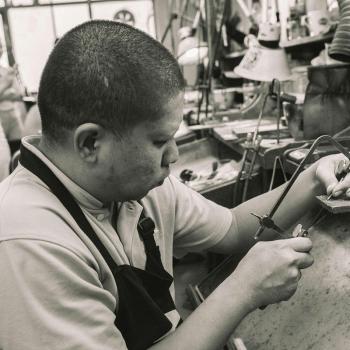When the church claims that Jesus was sinless, what does that mean? In this series’ first article, “A Flawless Hero,” I discuss the two possibilities that might arise by that question. The second article in this series, “Holy Outlaw” asks whether Jesus ever broke biblical law. Today, I’ll discuss the doctrine of original sin, and how some Christians believe Jesus escaped from it. Please read my first article for a recap of that doctrine.

Original sin
Those who support the idea of original sin have a problem on their hands if they want to claim that Jesus was sinless. This doctrine claims that everyone conceived by sexual activity inherits sinfulness through the seed of the original father, Adam. So, as long as Jesus was conceived by the sexual union of a man and a woman, he would be inherently sinful.
Enter the virgin birth. If Jesus were born of a virgin, then we might say that he was born free from the burden of original sin, since no sinful seed was used in the making of this child. Furthermore, if Mary had been immaculately conceived herself, and she was born free from original sin, then her son Jesus would be doubly sinless.
Then, if we wanted to maintain that Jesus was the only completely sinless human being, we would need the doctrine of the perpetual virginity of Mary. That way Jesus would have no biological brothers or sisters. Since the Bible mentions siblings, we might get around this by claiming that they were the children of Joseph from a previous marriage. So, it seems that regarding the sinlessness of Jesus, the Catholics have it all wrapped up compared to the Protestants. They make a pretty tight case. Except that there are two problems with the doctrine of original sin.
Problems with Original Sin
First, it is unfair of God to hold people accountable for the sins of their ancestors. Of course, God’s self-description in Exodus 34:5-7 says that God punishes people up to the third and fourth generation for their ancestors’ misdeeds. But note the limit on God’s retribution in that passage—only three or four generations. God doesn’t hold us responsible for our primogenitors’ sins. Later, as we see the development of people’s understanding of God, Ezekiel 18.20 says that it’s actually only the individual sinner who will be judged, and not their descendants. These scriptures discredit the doctrine of original sin.
Second, the combination of original sin and the virgin-birth escape clause takes away from the full humanity of Christ. Of course, it’s a logical fallacy to say that Jesus is fully human and fully divine, rather than 50% one and 50% the other. But we can leave some mystery in there for the theologians. However, it’s impossible to say that Jesus is fully human and also sinless. A sinless Christ could never be fully human. I don’t discount the Virgin birth on the basis that God is incapable of miracles—I have seen too many miracles for that. I admit that God certainly could have chosen to impregnate a virgin if God wanted to (though that does raise the issue of consent). What I discount is original sin, and thus the necessity of virgin birth as an escape clause. If we insist on the combination of original sin and virgin birth, then we must by necessity reject the idea that Jesus was fully human and fully divine. We must say he was half and half.
Was Jesus a Mary Sue?
In my last article, I discussed the literary concept of the Mary Sue, the stereotypical hero who has no moral flaws. Such a hero is boring at best, and unbelievable at worst. Such a hero is completely unrelatable. And, of course, the whole purpose of the incarnation was so that God could relate to us, and we could relate to God. To say that Jesus was sinless in this way is to deny his full humanity. It is to say that Jesus was like us in every way, except for the fact that he was completely unlike us.
In 1995, Joan Osbourne ticked off all the fundamentalists by asking, “What if God Was One of Us?” Many were offended that her song made Jesus too human. But what if Jesus is offended when our theology makes him too divine and doesn’t allow for enough humanity on his part? Claims that Jesus was the only one to escape (fallacious) original sin, or that he never broke a commandment suggest that he really wasn’t one of us.
<iframe width=”560″ height=”315″ src=”https://www.youtube.com/embed/aDdOnl0bHO4″ title=”YouTube video player” frameborder=”0″ allow=”accelerometer; autoplay; clipboard-write; encrypted-media; gyroscope; picture-in-picture” allowfullscreen></iframe>
Is There Any Way That Jesus Was Sinless?
By now, I probably sound like I’m dead set against claiming that Jesus was sinless. I’m not. I just reject original sin (and thus Jesus’ participation or exemption from it). I also reject the idea that Jesus never broke biblical law—a whole different definition of sin. But there is a way I think we can say that Jesus was sinless, and still stay true to who Jesus was. For that, you’ll need to wait for my next article, which finishes the series.












